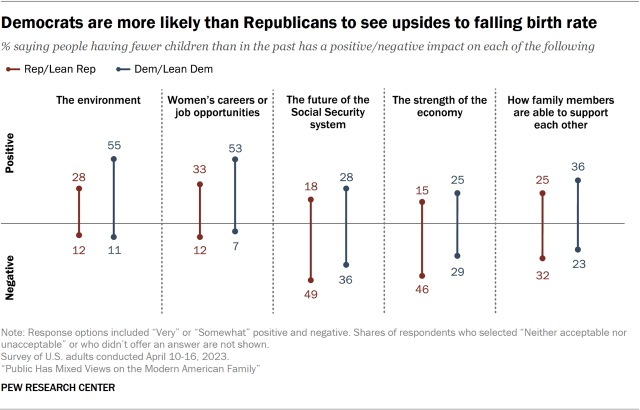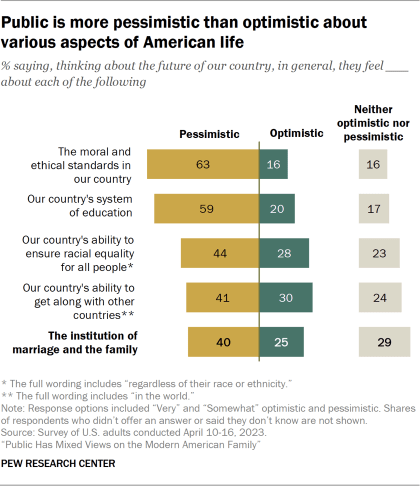
In thinking about the future of the United States, Americans are more pessimistic than optimistic about the institution of marriage and the family. Overall, 40% say they are very or somewhat pessimistic, while 25% are very or somewhat optimistic. About three-in-ten (29%) say they’re neither optimistic nor pessimistic.
To be sure, the public is pessimistic about a lot of things these days – not just the family. Majorities say they’re pessimistic about the country’s moral and ethical standards (63%) and its educational system (59%).
In addition, the public is more pessimistic than optimistic about the country’s ability to ensure racial equality for all people regardless of their race or ethnicity (44% pessimistic vs. 28% optimistic) and its ability to get along with other countries in the world (41% pessimistic vs. 30% optimistic).
Race and ethnicity
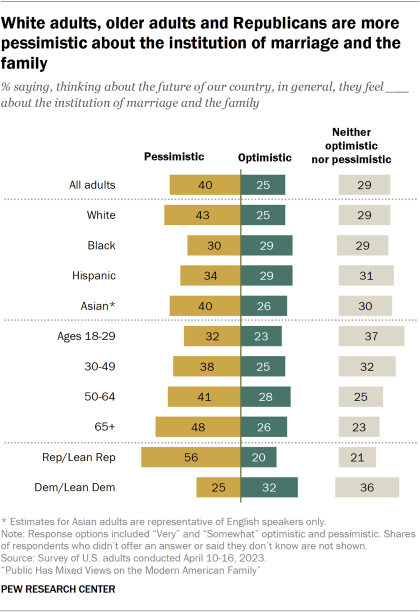
When it comes to the future of the family, views vary widely along key demographic lines. Across racial and ethnic groups, White adults express higher levels of pessimism about the institution of marriage and the family (43% are pessimistic) than Black (30%) and Hispanic adults (34%).
At 40%, Asian adults are more pessimistic about this than Black adults but not significantly more so than Hispanic adults. Black adults (12%) are about twice as likely as other racial and ethnic groups to say they don’t know how they feel about the future of marriage and the family.
Age
Views also differ by age. Older adults are the most likely to say they are pessimistic about the institution of marriage and the family. Roughly half (48%) of those ages 65 and older say they are very or somewhat pessimistic; adults younger than 30 are the least likely to feel this way (32% are pessimistic).
No age group is particularly optimistic about the institution of marriage and the family, but adults younger than 50 are more likely than their older counterparts to say they are neither optimistic nor pessimistic.
Partisanship
As with other opinions about family life in America, there is a wide partisan gap on this question.
More than half (56%) of Republicans and Republican leaners say they are very or somewhat pessimistic about the institution of marriage and the family. Only 25% of Democrats and Democratic leaners feel the same way. Many Democrats (36%) say they’re neither optimistic nor pessimistic about this. Only 21% of Republicans feel similarly neutral.
Conservative Republicans stand out as the most pessimistic about the future of marriage and the family, with 66% saying they are very or somewhat pessimistic. Liberal Democrats are the least pessimistic (21%).
How trends in family life will impact the U.S.
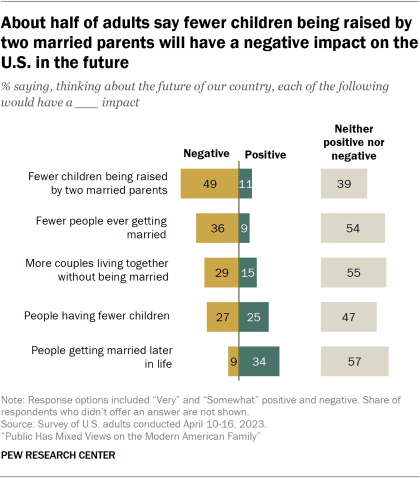
There are a variety of trends in relationships and family living arrangements that are changing American life. Some are viewed more negatively than others, but in many cases, the public is taking these trends in stride.
The fact that fewer children are being raised by two married parents is viewed the most negatively among the trends asked about in the survey. Some 49% of adults say this will have a very or somewhat negative impact on the country’s future. Only 11% say this trend will have a very or somewhat positive impact, while 39% say the impact will be neither positive nor negative.
Majorities of Americans see several key marriage trends as having neither a positive nor negative impact. For those who do see an impact, the balance of opinion varies by trend:
- When asked about fewer people getting married, 36% say this will have a negative impact on the future of the country, while only 9% say it will have a positive impact.
- 29% say more couples living together without being married will have a negative impact, while 15% say the impact will be positive.
- More see the impact of couples marrying later in life as positive than negative (34% vs. 9%).
- The public has mixed views of the trend toward people having fewer children: 25% say this will have a positive impact, while 27% say the impact will be negative. Some 47% say the impact will be neither positive nor negative.
Gender
Men and women have similar outlooks on the future of the institution of marriage and family – both are more pessimistic than optimistic. But there are significant gender gaps in views about the impact specific trends in family life will have on the United States. Men are more likely than women to say all of the trends included in the survey will have a negative impact.
For example, 55% of men say fewer children being raised by two married parents will have a negative impact on the future of our country, compared with 45% of women. And by a margin of 12 percentage points, men are more likely than women to say fewer people ever getting married will have a negative impact (43% vs. 31%). Similarly, while 35% of men say people having fewer children will impact the U.S. negatively, only 21% of women say the same.
Partisanship
Republicans and Democrats have very different outlooks on how trends in family life will impact the country, with Republicans expressing more negative views. The gaps range from 17 to 29 points on four of the five items included in the survey.
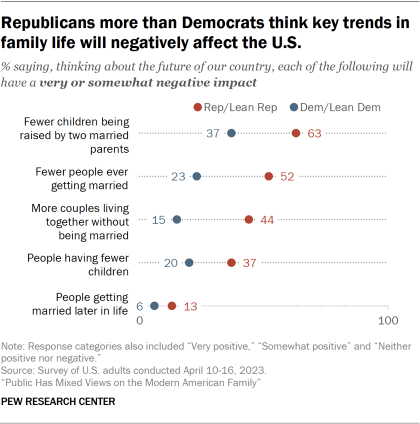
About half of Republicans (52%), compared with 23% of Democrats, say fewer people ever getting married will have a negative impact on the future of the country. Similarly, while 44% of Republicans say more couples living together without being married will have a negative impact, only 15% of Democrats say the same.
Republicans are also more likely than Democrats to say fewer children being raised by two married parents and people having fewer children will have a negative impact. Relatively few from either party see the trend toward people marrying later in life having a negative impact in the future, though Republicans are still more likely than Democrats to say this.
About half or more Democrats view each of these trends as having neither a positive nor negative impact on the future of the family. With the exception of people marrying later in life (38%), only about a third or fewer say the impact will be positive.
Again, conservative Republicans stand out when taking party and ideology into account. Majorities say fewer children being raised by two married parents (72%), fewer people ever getting married (63%) and more couples living together without being married (56%) will have a negative impact on the future of the country. In each case, conservative Republicans are much more likely than moderate or liberal Republicans to express this view.
Views of falling fertility rates
It’s been widely reported that the birth rate in the U.S. has been falling in recent years. This trend has implications for individuals and families but also for the country more broadly. While many Americans don’t see much of an impact, some see upsides and downsides associated with this trend.
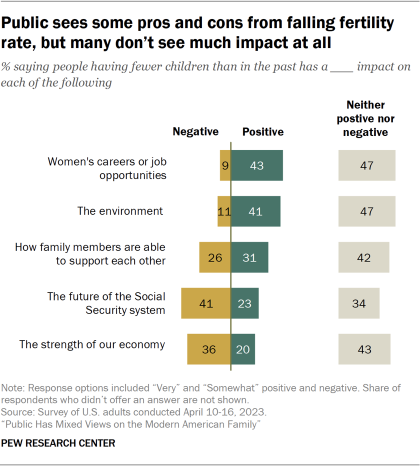
More say people having fewer children than in the past has a positive impact than say it has a negative impact on each of the following:
- Women’s careers or job opportunities: 43% positive versus 9% negative.
- The environment: 41% positive versus 11% negative.
More see a negative impact than a positive one from falling fertility rates when it comes to each of the following:
- The future of the Social Security system: 41% negative versus 23% positive.
- The strength of the economy overall: 36% negative versus 20% positive.
The public is divided over the impact this trend has on family members’ ability to support each other – 31% say positive, 26% negative and 42% say neither positive nor negative.
While women and men have similar views of how falling fertility rates impact the environment, women are slightly more likely than men to say it will have a positive impact on women’s careers (44% vs. 41%).
On the flip side, men are more likely than women to point to this trend’s negative impact on Social Security and the economy. (The gender gaps on these items are more than 10 points.)
Partisanship
Democrats are more likely than Republicans to view the trend toward people having fewer children as positively impacting various aspects of life and society. At least half of Democrats say this trend has a positive impact on women’s careers (53% vs. 33% of Republicans) and on the environment (55% vs. 28% of Republicans).
For their part, about half of Republicans (49%) say this trend negatively impacts the future of the Social Security system, and 46% say it has a negative impact on the economy. Democrats are less likely to see the trend as harmful in either area (36% say this for Social Security and 29% for the economy).
